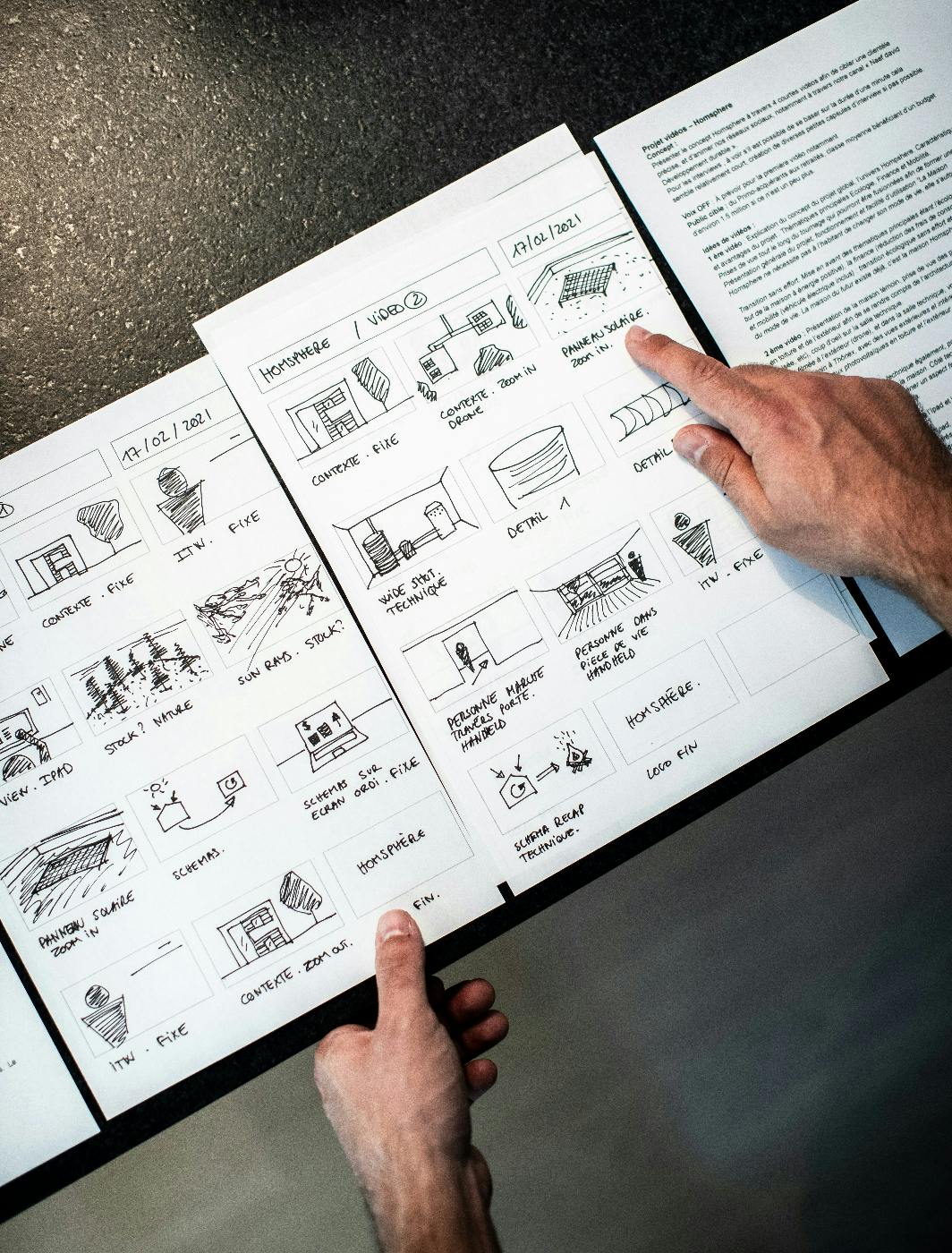
This concise and compelling summary of who you are and what you do has become the cornerstone of effective networking and personal branding.
We live in a world where attention spans are fleeting, and opportunities can slip away instantly; mastering the art of the elevator pitch is more vital than ever. This concise and compelling summary of who you are and what you do has become the cornerstone of effective networking and personal branding. Despite the evolving landscape of communication and technology, the elevator pitch remains a powerful tool for making a memorable impression and seizing valuable opportunities.
We have covered this subject before here at ThoughtLab; however, it deserves at least one more go-round. So, we’ll start with the basics—the who, what, and how—and then look at the elevator pitch from a storytelling perspective.
Storytelling is vital to a successful process if you're building a brand. ThoughtLab has master storytellers who can help you craft your brand story to reach more eyes and fill more minds. More on that later. For now, let’s talk elevator pitches.
Understanding the Elevator Pitch
The term "elevator pitch" originates from having only a short elevator ride, typically lasting about 30 seconds to a minute, to make a lasting impression on someone you want to connect with. It's a brief, persuasive speech that sparks interest in yourself and your actions. The goal is to deliver it in a way that captures attention and prompts further conversation.
Why It's Still Vital
First Impressions Matter: In a fast-paced world, first impressions are often formed within seconds. A well-crafted elevator pitch allows you to quickly and effectively communicate your value proposition, leaving a positive impression on those you encounter.
Opportunity Recognition: Opportunities can arise unexpectedly, and having a polished elevator pitch ensures you're prepared to seize them. Whether at a networking event, a chance encounter, or even a social gathering, succinctly conveying your expertise and aspirations can open doors to new connections and opportunities.
Clarity and Focus: Crafting an elevator pitch requires distilling complex ideas into simple, digestible nuggets of information. This process helps you clarify your goals and objectives and ensures that others understand them clearly.
Networking Effectiveness: Networking is all about building relationships, and an elevator pitch serves as your introduction to potential collaborators, clients, or employers. A well-delivered pitch piques curiosity and invites further conversation, laying the foundation for meaningful connections.
Personal Branding: Your elevator pitch reflects your personal brand. It communicates your unique strengths, skills, and values, helping you stand out in a competitive landscape. Consistently delivering a compelling pitch reinforces your brand identity and establishes you as a credible and memorable professional.

Crafting Your Elevator Pitch
Crafting an effective elevator pitch requires careful consideration and refinement. Here's a step-by-step guide to help you create a pitch that leaves a lasting impression:
Know Your Audience: Tailor your pitch to the specific needs and interests of your audience. Consider who you're speaking to and what they might find most compelling about your work or expertise.
Start with a Hook: Capture attention from the outset with a compelling opening statement or question. This could be a thought-provoking statistic, a relevant anecdote, or a bold statement highlighting your unique value proposition.
Highlight Your Unique Selling Points: Focus on what sets you apart from others in your field. Highlight your key strengths, accomplishments, and experiences, demonstrating your expertise and credibility.
Keep It Concise and Clear: Remember, you only have a short window of time to make an impact, so keep your pitch concise and to the point. Avoid jargon and technical language, and strive for clarity and simplicity.
End with a Call to Action: Conclude your pitch with a clear call to action that prompts further engagement. Whether exchanging contact information, scheduling a follow-up meeting, or inviting questions, it makes it easy for the listener to take the next step.
Examples of Effective Elevator Pitches
For a Freelance Graphic Designer:
"I help businesses elevate their brand identity through stunning visual design. With over five years of experience in graphic design and a passion for creative storytelling, I specialize in creating compelling visuals that resonate with target audiences and drive results."
For a Tech Startup Founder:
"I'm the founder of [Startup Name], a tech company revolutionizing how businesses manage their data. Our innovative platform harnesses the power of artificial intelligence to automate data analysis and unlock actionable insights, empowering organizations to make smarter decisions faster."
For a Marketing Consultant:
"As a marketing consultant, I partner with small businesses to develop strategic marketing plans that drive growth and maximize ROI. With a data-driven approach and a focus on building authentic customer connections, I help my clients stand out in crowded markets and achieve their business goals."
Now, we can employ the elevator pitch if we think about the question we often get in social situations, business meetings, and the like—the dreaded, “So, what do you do?”.
Those who think the elevator pitch is just something from Mad Men understand that many people think of a “one-liner,” as discussed in Donald Miller’s Story Brand world.
As stated above,, the elevator pitch and the one-liner are remarkably similar and equally vital to business. Both are about telling a story that catches the ear and makes the hearer want to know more. That’s the power of storytelling.

Storytelling
One element remains constant and powerful in marketing and branding: storytelling. From ancient myths to modern advertisements, stories have captivated audiences, forged connections, and shaped perceptions. In this highly competitive marketplace, the ability to craft and share compelling narratives is more vital than ever.
1. Human Connection
At its core, storytelling is about human connection. It taps into our innate desire to relate to others, to share experiences, and to feel understood. By weaving stories into your brand narrative, you create opportunities to connect with your audience on a deeper emotional level. Whether through shared values, everyday struggles, or aspirational dreams, storytelling enables you to forge authentic connections that resonate with your audience and foster loyalty.
2. Emotional Engagement
Emotion is a powerful driver of human behavior, and storytelling is one of the most effective ways to evoke emotion. Through vivid imagery, relatable characters, and compelling plotlines, stories can stir emotions, from joy and inspiration to empathy and nostalgia. By infusing your brand with emotion-laden narratives, you can create memorable experiences that resonate with your audience long after encountering your brand. These emotional connections not only foster loyalty but also drive engagement and advocacy.
3. Differentiation
In a crowded marketplace, differentiation is critical to standing out from the competition. Storytelling provides a unique opportunity to differentiate your brand by highlighting what sets you apart. Whether it's your origin story, company values, or the unique benefits of your products or services, storytelling allows you to communicate your distinct identity memorably and compellingly. By crafting narratives that showcase your brand's unique personality, values, and offerings, you can carve out a distinct niche and attract loyal customers who resonate with your story.
4. Brand Consistency
Consistency is essential to building a solid and cohesive brand identity, and storytelling plays a crucial role in maintaining that consistency across all touchpoints. By establishing a straightforward brand narrative and weaving it into every aspect of your marketing communications, from your website and social media content to your advertising and customer interactions, you create a unified brand experience that reinforces your identity and builds trust with your audience. Consistent storytelling ensures that every interaction with your brand reinforces the same core message, strengthening brand recall and recognition.
5. Memorable Brand Recall
In a world bombarded with messages and advertisements, memorable brand recall is essential to cutting through the noise and capturing consumers' attention. Storytelling can make your brand memorable by creating vivid, engaging narratives that stick in people's minds long after encountering them. Whether it's a catchy tagline, a memorable origin story, or a compelling customer testimonial, storytelling provides endless opportunities to create memorable brand experiences that leave a lasting impression on your audience.
6. Building Trust and Credibility
Trust is the foundation of any successful brand-consumer relationship, and storytelling is a powerful tool for building trust and credibility. By sharing authentic stories that showcase your brand's values, integrity, and commitment to customer satisfaction, you demonstrate transparency and authenticity, earning the trust and loyalty of your audience. Through storytelling, you can humanize your brand, making it relatable and approachable, and establish yourself as a trusted authority in your industry.
7. Inspiring Action
Ultimately, the goal of branding is to inspire action, whether it's making a purchase, signing up for a service, or advocating for your brand. Storytelling can inspire action by tapping into people's emotions, values, and aspirations. By crafting narratives that resonate with your audience's desires and motivations, you can drive them to take the desired action, whether purchasing, sharing your content, or joining your community. You can move beyond mere transactions through storytelling to create meaningful connections that drive long-term loyalty and advocacy.
Storytelling is not just a marketing tactic; it's a fundamental aspect of branding that can transform your brand's identity, engagement, and impact. By harnessing the power of storytelling, you can forge authentic connections, differentiate your brand, build trust and credibility, and inspire action. Whether you're a startup looking to establish your brand identity or an established company seeking to reignite passion and loyalty among your audience, storytelling is the key to unlocking your brand's full potential.
Summing Up
We live in a high-tech, fast-paced world, and perhaps a two-minute conversation seems arcane. Still the elevator pitch remains a vital tool for making a lasting impression and seizing valuable opportunities. By mastering the art of crafting and delivering a compelling pitch, a quick story that compels the listener to ask for more, you can effectively communicate your value proposition, build meaningful connections, and elevate your personal brand. So the next time someone asks you, "What do you do?" be ready to deliver a pitch that leaves them asking for your business card and setting up a meeting.
Tell A Story
Your brand deserves to have its story told and told well. A compelling mixture of eye-catching designs, spot-on messaging, and impactful calls to action—you get this story from storytelling masters.
ThoughtLab's attention to and love of storytelling makes it so good at branding. Expanding on the elevator or the one-liner, ThoughtLab is here to weave a story filled with the perfect elements and present your brand to the public with a narrative that compels and holds.
Your elevator pitch or one-liner gets them to stop and listen; ThoughtLab helps you build the story that keeps them returning for more. Contact ThoughtLab today and get your well-crafted story out there.

